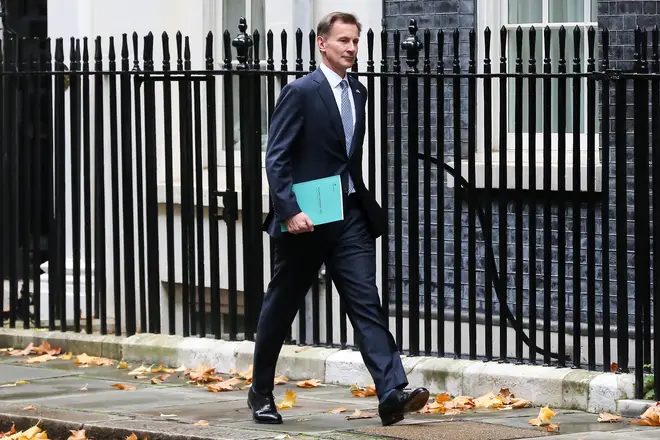
Nick Ferrari 7am - 10am
17 November 2022, 14:52

Millions of households will face higher tax bills after chancellor Jeremy Hunt’s autumn statement today.
Here we take a look at who is winning and who is losing in this statement:
WINNERS
Workers on National Living Wage
Those who are paid National Living Wage are set to have an increase in their hourly rate.
These are the current rates for National Living Wage:
- Apprentices or those under 18: £4.81 an hour
- 18-20 year olds: £6.83 an hour
- 21 and 22 year olds: £9.18 an hour
- 23 and over: £9.50 an hour
These are now set to be increased by nearly 10%, with hourly rates becoming:
- Apprentices or those under 18: £5.28 an hour
- 18-20 year olds: £7.49 an hour
- 21-22 year olds: £10.18 an hour
- 23 and over: £10.42 an hour
Jeremy Hunt said this would mean an annual payrise of £1,600 for a full-time worker on national living wage and could help two million people.
People on benefits
Benefits will be rising in line with inflation from April. This will equate to a 10per cent uplift or an extra £500 a year for claimants.
There had been concerns that the government could switch benefits to rise in line with average UK earnings instead and this would have been a much lower figure with some families even reportedly £970 a year worse off.
Increasing the benefits in line with inflation will cost the government £5 billion.
The government also announced additional cost of living payments for people on benefits including: £900 for those on means-tested benefits and £150 for those on disability benefits.
People who get tax reductions for being married or blind
The married couple’s allowance and blind person’s allowance will both rise by September.
The marriage allowance will be valued at between £4,010 and £10,375 and the blind person’s allowance will be valued at £2,870.
Pensioners
Under the triple lock pledge, which is remaining in place, the state pension must rise each year in line with the highest average earnings, the previous September’s inflation rate or 2.5% every April – whichever is highest.
The government announced today that the state pension will rise by 10.1% come April which will see a rise from £185.15 to £203.85 a week – the highest increase on record.
The government also announced it would be offering up to £300 to help pensioners with a cost of living payment.
Households
The government is extending the energy price guarantee, which caps the average household energy bills at £2,500 a year.
From April it will continue for another 12 months at a higher level of £3,000 – a rise of up to £500 on current bills.
People who live in social housing
Rent for social housing tenants will be capped at 7 per cent for next year, stopping landlords increasing rent with inflation.
Under the current rules this could have risen by up to 11.1% but now they will only be able to rise it up to 7%.
LOSERS
Workers
The personal allowance tax threshold and the higher-rate tax threshold are being frozen until 2028. This could be a problem for those who have just been given an hourly payrise as they could be dragged into the higher tax band and therefore give more of their money to the taxman.
Higher earners
The rate at which people pay an additional 45p of income tax will be reduced from £150,000 to £125,000 people – meaning more people will pay it. Figures suggest that an extra 246,000 people will now be in the top tax bracket.
Electric car drivers
Owners of electric cars will now need to pay road tax from 2025/2026. This will also be the first time that people who have electric cars will be made to pay the vehicle excise duty (VED) and a charge of £350 if the new car costs more than £40,000 new.
Families
The income threshold where families begin to lose entitlement for child benefit is frozen at £50,000. If a household has one earner who makes more than £50,000 then they will lose some entitlement to child benefit. If a household has an earner who makes more than £60,000 they will not be entitled to anything.
Those who pay council tax
At the moment, local authorities cannot rise council tax above 2.99% without a local referendum.
But in today’s budget Jeremy Hunt announced that council tax can now be increased by 5% without a vote.
Homebuyers
The threshold for when a homebuyer will be paying the stamp duty has been reduced from 2025. From March 2025, the threshold will be cut from £250,000 to £125,000 and from £400,000 for first-time buyers to £300,000.